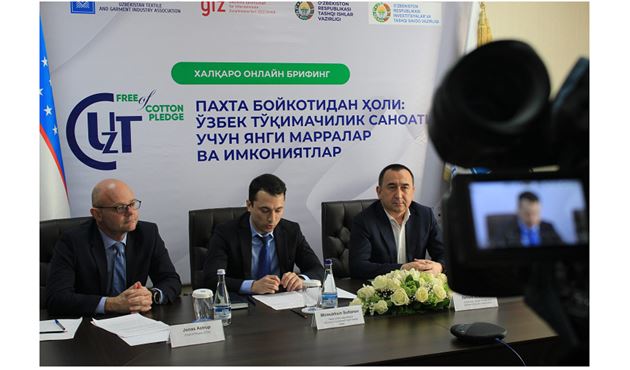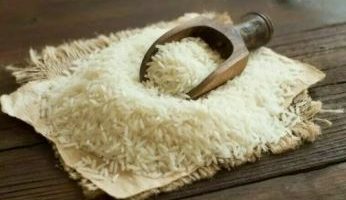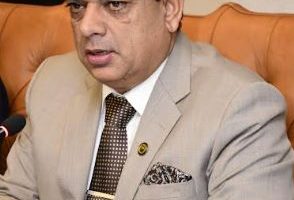Uzbekistan Textile and Garment Industry Association held int’l online briefing

The Uzbekistan Textile and Garment Industry Association, with the assistance of the Ministry of Investment and Foreign Trade, the Ministry of Foreign Affairs, organized an online briefing at the international level.
The main purpose of the event is to bring to the world community information about reforms in the textile industry of Uzbekistan, further steps of the industry “beyond the boycott”, the advantages of cooperation and collaboration and the goals of becoming a regional textile hub. About 180 representatives of the textile industry from 30 countries joined the briefing.
The speakers were not chosen by chance – they represented organizations that made a significant contribution to the eradication of child and forced labor, and then to the abolition of the boycott of Uzbek cotton, witnessed reforms and changes. The speakers told from personal experience what the textile industry of Uzbekistan is today, and how the government of the country fully supports business representatives, investors, pays special attention to issues of respect for human rights and freedoms, creating favorable conditions for workers.
Why is the textile industry unique? What are her strengths? What does the industry offer to foreign brands?
Speaking about the textile industry of Uzbekistan, experts noted that this is the only country in the world that has managed to completely eradicate forced labor in a very short time and prevent the subsequent growth of this phenomenon.
The uniqueness of the industry lies in the fact that Uzbekistan was able to establish capacities for 100% processing of cotton fiber within the country, while other “textile” countries could only dream of it.
Another important advantage is that the country has sufficient raw materials and is not dependent on external situations.
Uzbekistan continues its reforms and, together with the International Labour Organization, has successfully implemented the priorities identified in the Decent Work Program for 2014-2020. Today, a new Country program on decent work in Uzbekistan for 2021-2025 has been adopted, in which special attention is paid to such issues as creating decent working conditions, reducing informal employment and strengthening social protection, improving the legal framework governing labor relations.
Jonas Astrup, head of the Third Party Monitoring project, emphasized that Uzbekistan is free from any kind of forced and child labor, and this fact was confirmed by international organizations. J.Astrup called on the world community to widely disseminate this information and assured that all the “doors” for cooperation are open in Uzbekistan.
According to the Third Party Monitoring report, the ILO stated during a briefing held on March 1 this year that no cases of forced labor were registered by the end of 2021. In response to the official statement of the ILO on the status of Uzbekistan, the Cotton Campaign coalition canceled the global boycott on Uzbek cotton.
Speaking about cooperation with international organizations, the representative of the Ministry of Investment and Foreign Trade Mirmukhsin Sultanov spoke about the developed “Roadmap” for the development of cooperation with international brands and the promotion of Uzbek textiles in new promising markets such as North Africa, South Asia, Europe and the USA.
The representative of the Ministry of Foreign Affairs Sultonbek Imomov noted that the Ministry of Foreign Affairs and Embassies of the Republic of Uzbekistan abroad are ready to consider proposals of foreign companies for cooperation.
Joanna Moest, representative of the German Organization for International Cooperation (GIZ), spoke about the project “Sustainable development and value-added in the cotton industry”, which has already begun to bear fruit. She also informed the participants about the seminars on the implementation of world certificates and the training of merchandisers within the framework of the Fashion Incubator Tashkent project.
Dan Petterson, CEO of Silverleafe, shared his personal experience of doing business in Uzbekistan. He told his vision as an investor and industry expert about the changes in the business environment in the country, in particular the textile industry. He noted that Silverleafe will work hard to attract international brands to Uzbekistan.
Chairman of the Uzbekistan Textile and Garment Industry Association Ilkhom Khaydarov noted that the cancellation of the boycott is a historic event that has become a turning point for the development of the Uzbek textile industry. This is one of the few measures that today contributes to the formation of a positive background in relation to the Uzbek textile industry, export growth, investment attraction, creation of new jobs for millions of people in the country, the formation of a new responsible business model based on the principles of decent work at all levels of the supply chain.
It should be noted that today the textile industry of Uzbekistan is represented by over 7000 companies that produce all types of textile products. Over 401.0 thousand people work in the industry, of which 60% are women and young people. It is the latter fact that should be the focus of the international community’s attention, since the subsequent well-being of workers’ lives depends precisely on orders from foreign companies.
Now that a new space has been opened up before us, the industry faces great challenges ahead, and we are firmly confident that we will ensure the implementation of our goals and become full participants in the global textile community.
Working with global textile brands is an important direction in the development of the textile industry, new vectors of cooperation are opening up by entering new commodity markets, increasing exports of finished products, and as a result, social issues are being resolved.
The dialogue established in recent years between international organizations and Uzbek agencies has reached a fundamentally new level. The recognition of the fact of the complete absence of child and forced labor in the cotton harvest in Uzbekistan implies further strengthening of cooperation between brands and Uzbek textile manufacturers.
Today it can be stated that Uzbekistan is ready to work with brands today. For this purpose, conditions have been created for the organization of entrepreneurial activity. There are financial resources, labor resources capable of skillfully conducting production and business in an open market, an effective transport and logistics system has been built that provides optimal routes and corridors for cargo delivery, manufactured products are certified through their harmonization with international requirements and standards. Together with international certification companies, work is being carried out on the implementation of international standards. Every year, the number of Uzbek textile enterprises that have received certificates according to the standards “OEKO-TEX Standard 100”, “BSCI”, “Sedex”, “GOTS”, etc. increases.
The International Finance Corporation (IFC) has introduced regulations that promote reforms in the cotton sector in certain regions of Uzbekistan and the introduction of a system of socially responsible and environmentally sustainable cotton (SCSS).
Related News

President FPCCI praises govt’s decision to give rebate to rice exporters
ISLAMABAD, JAN 26 /DNA/ – Atif Ikram Sheikh, President Federation of Pakistan Chambers of CommerceRead More

ICCI urges real estate designation as industry
ISLAMABAD, JAN 25 /DNA/ – President of the Islamabad Chamber of Commerce and Industry (ICCI),Read More


Comments are Closed